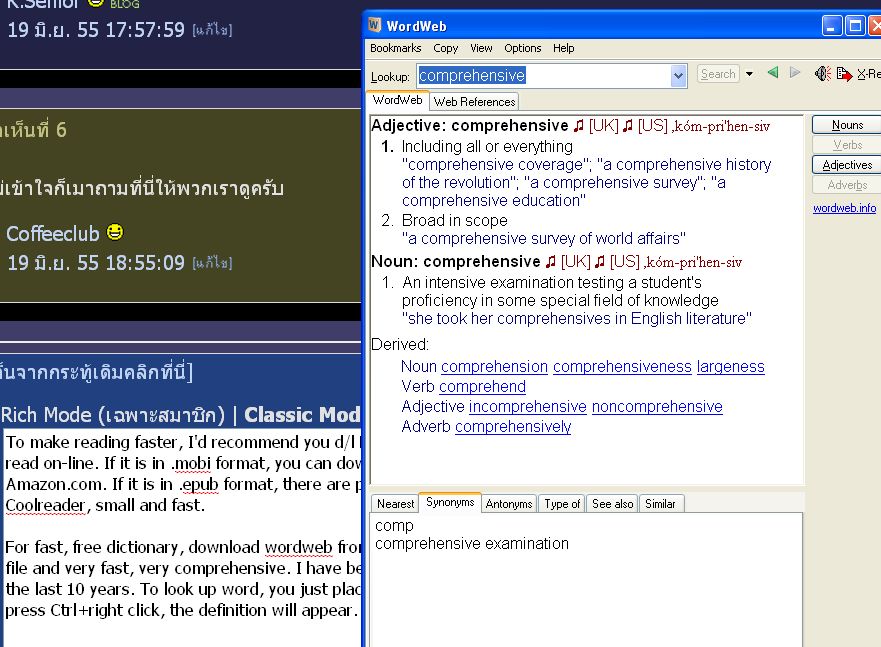 |
นั่นน่ะสิน่าเห็นใจ ถ้าต้องอ่านเรื่องที่ไม่ถนัดแล้วไม่ชอบด้วยเจอหินๆเข้าหละใจฝ่อเหมือนกันนะ
ยิ่งกรณีของเราเรายิ่งแย่ใหญ่เลยเพราะเราจำเป็นต้องอ่านเพื่อเอาความรู้ไปรักษาตัวเอง คือตอนอายุ 16-17 เราป่วยเป็นโรคจิตเรียนหนังสือไม่รู้เรื่อง พอไปรักษาเราไปทะเลาะก้บจิตแพทย์เราเลยต้องรักษาตัวเอง เราไปซื้อผลงานของ Sigmund Freud ที่แปลจากเยอรมันเป็นอังกฤษ มาหัดอ่านเองเพราะหวังจะเก่งกว่าจิตแพทย์ (คือสมัยนั้นคิดแบบเด็กๆ) แต่โหอ่านๆไปแล้วแทบกระอักเลือดเพราะติดศัพท์บานเบอะเลย...555+++....
ประหลาดที่เรารักษาตัวเองหายมันไม่ได้เป็นเพราะเรียนรู้เรื่อง psychoanalysis หรอก หากแต่เป็นเพราะเราเรียนการแพทย์แผนจีนต่างหาก จากนั้นเราเลยบ้าจีนศึกษาแล้วค้นข้อมูลเจอว่า Joseph Needham ซึ่งเคยเป็น Professor of Sinology ที่ University of Cambridge เขียนวิธีฝึกกำลังภายในแบบนักพรตเต๋าไว้เป็นภาษาอังกฤษ (คัมภีร์ที่เป็นต้นภาษาจีนโดนเผาวอดไปตั้งแต่สมัย Cultural Revolution) เราเลยไปหามาอ่าน อ่านๆไปใกล้จะบ้าเพราะหน้าเดียวเจอศัพท์ที่ไม่รู้ตั้ง 20 กว่าคำ! Oh, my God. อีตา Professor คนนี้พี่แกเขียนภาษาอังกฤษระดับเทวดาหรือไงกันศัพท์มันถึงยากขนาดนั้น
^
นี่คิดๆย้อนอดีต แค่เล่าให้ฟัง แต่เราว่าเด็กสมัยนี้ลำบากน้อยกว่านะ เพราะความก้าวหน้าด้านคอมพิวเตอร์
ถ้าคุณอ่าน ebook ที่เป็น texts มี dictionary software ดีๆ แค่เอา mouse ชี้ไปที่ศัพท์ meanings มันก็มาแล้ว ไม่ยากเหมือนเปิด dictionary กระดาษ
จริงๆแล้วเราก็อ่อนศัพท์มากๆ เพิ่งมาเก่งเอาช่วงหลังๆตอนเลิกอ่านหนังสือกระดาษไป 10 กว่าปีนี่แหละ เพราะการอ่าน ebooks ทำให้เรียนภาษาอังกฤษได้เร็วกว่าอ่านหนังสือกระดาษตั้งหลายเท่า แถมการตัดแปะตัดแปะตัวอย่างประโยคบ่อยๆ ยังกลายเป็นทำให้เราเรียนรู้ writing ได้ไวกว่าเดิมด้วย
ลองไปอ่านข้อความข้างล่างนี้เรื่องวิธีที่เราคิดค้นขึ้นมาเพื่อสอน reading comprehension ซึ่งเราเริ่มพัฒนามาตั้งสมัยใช้กระดาษ ปากา และแฟ้มเก็บ notes ที่ใช้เรียนรู้ (สมัยนั้นเราเป็นครูเถื่อนติวภาษาอังกฤษแบบไม่มีใบอนุญาต...555+++...) จนพอคอมพิวเตอร์มันเป็นจากใช้ DOS มาเป็น Windows เราเลยเปลี่ยนขั้นตอนการเรียนรู้โดยใช้ computer software ขึ้นมาแทน ซึ่งเราคิดขึ้นมาเพื่อเอาไปใช้สอนนักเรียนในยุคหลังๆ ให้รู้ศัพท์เป็นจำนวนมากอย่างรวดเร็ว
แต่ จขกท เอาวิธีการของเราไปดัดแปลงเพื่อใช้สอนตัวเองเพื่อเรียนรู้เองก็ได้
ข้อความนี้คัดมาจากกระทู้เก่าคืออันนี้
http://www.pantip.com/cafe/library/topic/K12077457/K12077457.html
ข้อความตอนต้นๆ มันดูเหมือนคุยกันเรื่องการสอนเพราะเราเขียนข้อความพวกนี้เพื่อแนะนำครูสอนภาษาอังกฤษเรื่องวิธีสอน reading comprehension นั่นเอง
ลองอ่านดู จขกท อาจได้แนวคิดไปเรียนรู้ด้วยตัวเอง
Your best bet is to ditch the textbooks and instead teach reading comprehension from newspaper articles.
Ill demonstrate to you my teaching strategies. I give my students an article from a newspaper, and ask them to read and try to understand it. Then, I ask them some questions to see how much they understand what they've just read.
From the article, I pick one of the words that the students are struggling to understand, and I construct from that word 4 to 5 sentences with different meanings. I explain the meaning of each sentence. Then, I ask the students to reread the article and guess the meaning of that word according to the contextual clues.
I do the same with all the difficult words. A difficult word doesn't always mean that it is a big and long word. A word is recognized as difficult when it has many subtle nuances of meanings and it appears in a highly sophisticated construction. In the process of constructing many different sentences, I write out all the Greek and Latin roots that are the etyma of the words being taught.
This is a good time to teach students how to use a good monolingual learner's dictionary (MLD). There are many of them. Oxford Advanced Learner's Dictionary is one of the best MLDs, and its the one I highly recommend.
As I go along, I teach grammar briefly; I only focus on the topics that truly affect the student's ability to interprete the texts correctly.
In note taking, the students should only write down the words being learned, the sentences that can be formed from such words and the Greek and Latin roots that are the etyma of such words for the purpose of memorization by association. Students should not write down the meanings of any word. Looking at a word with its meanings (without any sentence samples) and trying to memorize them like a parrot can severely dull the brain. Looking at many self-explanatory sentences does stimulate the brain's mechanism that grasps the meanings of the texts instinctively and intuitively.
This is the outcome of frequent revisions by reading many different sentences that demonstrate varieties of collocations and sentence structure types: Whenever the student reads those sentences in his note, it rings a bell. He remembers the meanings of many words through association of all the ideas surrounding such words, and he can sense that each sentence is becoming more and more self-explanatory each day.
Student's notes should be arranged in alphabetical order in a ring folder. On each sheet of paper, there should be only one entry of one word with its etymon, possible sentences that that can be formed from that word and cross-references associating that word with other words that share the same etymon or the same grammatical construction --synonyms and antonyms can also be included. This type of arrangement makes it very convenient for revision.
If the students take notes at random in an exercise book, they won't be able to find any notes when the teacher wants to add more information such as more sentences that can possibly be formed from any particular word.
In the old days, I handed out lessons in hard copy, wrote essential details on whiteboard with markers, and my students took notes on separate sheets of paper to be filed in alphabetical order in a ring folder. But now, I do all of my teaching on computer, using only digital media. So my student's note taking has undergone a major facelift/development: the program OneNote is being used instead of a ring folder. Each note is divided into sections, subsections, pages and subpages, and all cross-references are achieved by hyperlinks. With OneNote, my students can sort their entries in alphabetical and/or chronological order, which makes it very convenient for revision, and it successfully serves the purpose of memorization by association. I think mind mapping can be done on OneNote far more effectively than on MindManager software.
แก้ไขเมื่อ 19 มิ.ย. 55 21:43:05
| จากคุณ |
:
fortuneteller   
|
| เขียนเมื่อ |
:
19 มิ.ย. 55 21:18:14
|
|
|
|
 |






